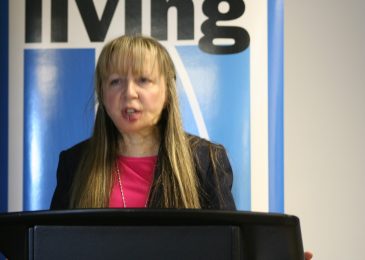KJIPUKTUK (Halifax) – Cuts by the Halifax Regional School Board (HRSB) to a program for youth with disabilities have left parents scrambling and a first voice community organization forced to lay off staff.

The Access to Community Education and Employment program helps youth with disabilities make an effective transition from high school, enhancing their employability and life skills. It is offered by Independent Living Nova Scotia (ILNS), a not for profit organization.
This year’s program will be completed, but 26 students who intended to register for the upcoming year will be left out in the cold.
“There is not a program within this community that serves the demographic that we serve There was a gap and that’s why we’re here. To cut funding will recreate that gap,” said Sherry Costa, executive director of ILNS. Costa was speaking at a press conference at the ILNS office on Bayers Road this morning.
The program was funded to the sum of $220,000. The School Board administers the funding, but the Departments of Community Services and Education and Early Childhood Development actually pay the bill.
Costa and her staff believe that complaints about what they considered bullying by the HRSB representative on the program team is what triggered HRSB’s funding withdrawal.
“I had staff come to me saying that they were being bullied, and I went to the School Board and said enough is enough,” Costa said. “Their response was then we are not going to be at the table.”
The bullying had been occurring for a long time, Costa claims.
There had been outside mediation in 2010, at that time it was clearly concluded that a HRSB individual assigned to the team exhibited bullying behaviour that caused a toxic work environment, stress and physical illness among her staff, Costa said.
The School Board counters that it was the concerns about the quality of the program that caused the funding withdrawal.
Local Xpress journalist JoAnn Alberstat quotes School Board spokesman Doug Hadley as saying that it expressed concern to ILNS about the quality and delivery of the program for almost two years.
Costa rejects these accusations. and read from a letter the School Board wrote in February full of praise for the program and the work of her staff.
Many students and parents who attended the press conference spoke about the program in glowing terms.
Ongoing support, relationship building and flexibility, and the program being designed and administered by persons with disabilities were mentioned as strengths.
ILNS doesn’t think of transition as a ten-month event with a beginning and an end. Persons with disabilities are always transitioning, said one parent.
The School Board had redirected the funding to the Nova Scotia Community College, who will offer a program come September.
Parents at the press conference worried that admission standards for that program are too stringent, and that not enough is known about its curriculum and personnel. A deadline to register has already passed, they said.
We believe there is room for many programs, said Costa. There should be room for the program we have been offering for years.
“This organization is run by persons with disabilities, for persons with disabilities. It is a first voice community program. It is nimble in that if a need is identified we’re flexible enough to make the adjustments.”
Concerned parents and students are planning to attend the June 22nd Halifax Regional School Board meeting in the hope of getting some answers.
Sign a petition to save the program.




So the money goes where? Not to the kids who need it , even though the funds are not provided by the dept. of education! Again , the money goes where?
I’m a student who a tended the program and yeah just cut with no other options atm I’m kinda stuck and I have to ask the hrsb this ….. hrsb will u give me a job sense the program is gone and will u give all of us jobs then
It’s very disappointing that the school board was not willing to work with the community-based Independent Living NS to resolve the differences so that this unique program could continue. As a result, this year’s participants have lost their summer of ongoing employment and transition support, and next year’s participants are out of luck, having missed the deadline for the replacement program the school board and province have set up through the community college. This is the second recent example of the provincial government, which had provided the funds for the ACEE program, being unwilling to work collaboratively with community-based organisations led by people who bring life experience to their work; the other example was WADE that provided employment support to African Nova Scotians.
Pingback: Cancelled transition program leaves youth with disabilities without options – Nova Scotia Advocate